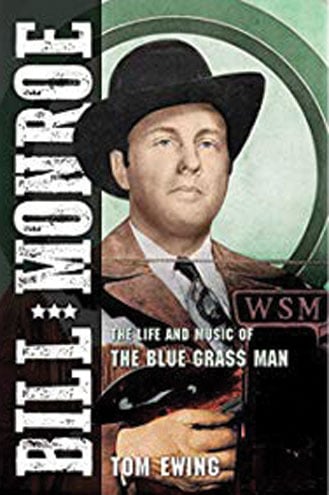BILL MONROE: THE LIFE AND MUSIC OF THE BLUE GRASS MAN
 BILL MONROE: THE LIFE AND MUSIC OF THE BLUE GRASS MAN
BILL MONROE: THE LIFE AND MUSIC OF THE BLUE GRASS MAN
BY TOM EWING
Univ. of Ill. Press 9780252041891. Hardcover, 656 pp., 30 b&w photos, $34.95. (Univ. of Ill. Press, 11030 S. Langley Ave., Chicago, IL 60628, press.uillinois.edu.)
Among the many things you can learn from Tom Ewing’s engaging, comprehensive biography of Bill Monroe is that the last three words the Father of Bluegrass Music ever spoke on stage to an audience—March 15, 1996 for the Friday Night Opry—were “We love you.” William Smith Monroe died six months later.
The life and career of Bill Monroe would be a daunting subject, even if the man himself hadn’t been so complex and complicated. We’re lucky, then, that Monroe hired a guitar player and singer named Tom Ewing. For ten years, Ewing traveled and worked with Monroe, getting to know the man and the music. And now, after interviewing 68 former Blue Grass Boys (among the 149 significant members of Monroe’s band who he lists in an appendix) and researching the archives and histories surrounding Monroe’s life, Ewing has written the definitive biography.
In the preface, though, Ewing writes, “This book is not necessarily a biography. It is, more accurately, a chronicle.” It’s right that Ewing sets a humble tone in writing about the life of Bill Monroe, but he has done a masterful job. Not only with the facts, but with setting Monroe’s life in the wider cultural context, in clarifying key moments in his life, and in describing the business, personnel, and recording aspects of Monroe’s music, all without the writing ever becoming dry or pedantic. Even at over 600 pages, it flies along.
We’ve known how important Monroe’s Uncle Pen and the African-American blues guitarist Arnold Schultz were to Monroe’s musical development, but Ewing also shows how important Bill’s mother, Malissa, was to him as a mother, musician (fiddle, accordion, harmonica), singer, and church-goer. Bill was Malissa’s eighth and last child. She gave birth to him at age 41 and passed away when he was ten. Our families are what form us. Ewing has dug deep into Monroe’s family on both sides, and what he’s come up with is fascinating and illuminating.
While there have been many books written about the man and his music (one of my favorites is Jim Rooney’s 1971 Bossmen, a double biography of Bill Monroe and Muddy Waters), this is the most complete and most compelling biography written on the life of Bill Monroe. For bluegrass fans, this book is both required and riveting.CVS
